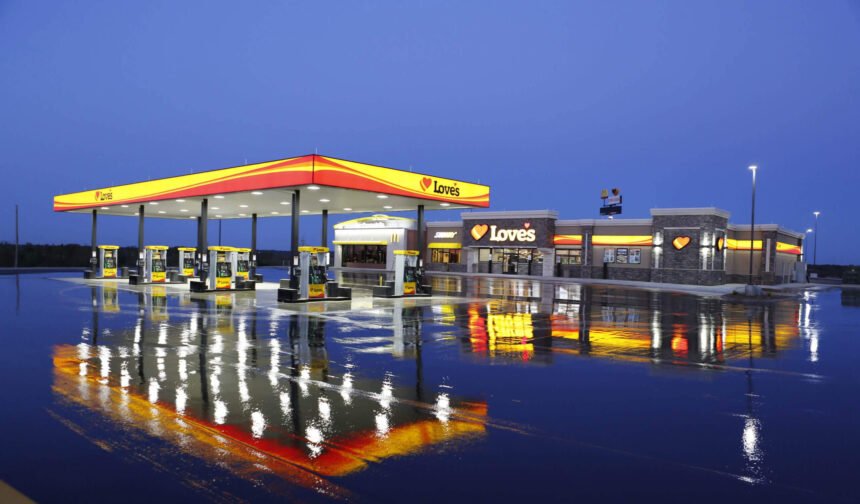Love’s Travel Stops & Country Stores stands as a cornerstone of the American highway experience, catering to both professional truck drivers and everyday motorists across the country. Its network of more than 650 locations in 42 states is paired with a reputation for innovation, customer service, and the ambition of continuous national expansion. This article will provide a comprehensive look into Love’s Travel Stops & Country Stores, exploring its business model, growth strategies, customer perception, and what sets it apart within the competitive travel stop landscape.
The Origins and Evolution of Love’s Travel Stops
Established in 1964 by Tom and Judy Love in Oklahoma, Love’s began as a modest service station, but it quickly expanded to meet the evolving needs of American motorists. The transition from standard fuel stations to full-service travel stops introduced a wider array of amenities—food courts, truck parking, showers, convenience stores, and more. Today, Love’s remains family-owned and headquartered in Oklahoma City, reflecting an enduring commitment to core values and high standards.
A Multifaceted Business Model
Love’s operates through two main store types:
-
Country Stores: Primarily fuel stations with attached convenience shops.
-
Travel Stops: Larger facilities found along highways, offering truck parking, showers, laundry, and fast food partnerships (e.g., Arby’s, Burger King, Subway, Wendy’s), as well as services tailored for truck drivers and families.
This approach allows Love’s to serve a broad customer base—from the long-haul driver seeking essential amenities to families looking for safe, clean stops on their journeys.
Expansion and Strategic Growth
Love’s is at the forefront of travel center expansion in 2025, committing over $1 billion this year alone for constructing 20 new stops and extensively remodeling 50 more. This ongoing Strategic Remodel Initiative (SRI) reflects an understanding that customer expectations change rapidly and that staying ahead in comfort, technology,
and cleanliness can set a brand apart.
By 2035, Love’s projects that more than half of its 655+ nationwide locations will be newly constructed or remodeled,
ensuring a consistently high-quality, modern experience for travelers.
A Focus on Amenities and Technology
Recent upgrades include:
-
Expanded truck parking (aiming to add 1,000 new spaces in 2025).
-
Innovative food and beverages featuring both national brands and Love’s proprietary offerings.
-
RV hookups and dedicated RV parking; 83 new hookups across 17 additional locations in 2025 alone.
-
Enhanced digital solutions, like the Love’s Connect app for reserving amenities, checking in, and accessing exclusive offers.
Customer Perceptions and Performance
Love’s has cultivated a strong reputation for “highway hospitality.” However, it faces competitive pressures and varying customer satisfaction scores. For example, its 2025 Net Promoter Score (NPS) was -11, underscoring that while many customers are loyal, there is an ongoing need for improvement in service and amenities. Industry feedback highlights especially high satisfaction among retail industry users and customers over 66 years of age,
indicating specific demographic strengths.
Industry Standing and Recognition
As of 2022, Love’s ranked #10 on Forbes’ list of America’s largest private companies, a testament to its scale and economic impact. Its market leadership is further solidified by a workforce of over 40,000 team members and a continual focus on employee training and innovation.
For broader industry insight, reference the authoritative Forbes list of America’s largest private companies, which includes Love’s as a top performer, underscoring its significance in the U.S. economy and travel sector (https://www.forbes.com/largest-private-companies/).[3]
Commitment to Professional Drivers
Truck drivers are the lifeblood of America’s supply chain, and Love’s caters to this audience with:
-
Well-maintained truck parking and fueling
-
Private showers and laundry services
-
Truck repair and tire care facilities
-
Dedicated areas for rest and meal breaks
Love’s also continues to acquire and partner with service providers in the trucking sector,
recently acquiring TVC Pro-Driver to add value for long-haul operators.
Community and Sustainability Initiatives
Love’s fosters a culture of giving back, supporting Children’s Miracle Network Hospitals and local nonprofits across the U.S.. Its sustainability efforts include:
-
Upgrading locations with EV charging stations to embrace the shift toward electric vehicles
-
Modernizing facilities for higher energy efficiency and reduced environmental impact
Opportunities and Challenges
A SWOT analysis suggests:
-
Strengths: Nationwide network, strong brand, expansion strategy, and diverse amenities
-
Opportunities: Growth in EV and RV travel, renovation of older sites, tech and digital engagement
-
Weaknesses: Customer satisfaction variances (NPS score), competition from new travel stop chains
-
Threats: Volatile fuel markets, evolving traveler behavior, and labor shortages
Why Love’s Remains a Top Pick for Travelers
-
Consistent Cleanliness: Industry-recognized restroom and facility hygiene
-
Diverse Offerings: From snacks to restaurant meals to professional trucking services
-
Convenience: Easy app-based services, nationwide reach, and fast service
Travelers—professional drivers, families, and solo road trippers—rely on Love’s for a sense of security, comfort, and efficient pit stops during their journeys.
Read More: The End of an Era: Ashwin Retires from IPL, Eyes Global Franchise Cricket
Conclusion
Love’s Travel Stops & Country Stores’ blend of tradition and innovation uniquely positions it for sustained success on America’s highways. With record investments in new locations, remodels, and technology,
Love’s is setting industry standards for what a modern travel stop can be. Ongoing attention to customer feedback and service quality will be the keys to maintaining its leadership as competition intensifies.
For a look at Love’s ranking in the business world and industry lists, check out the Forbes Largest Private Companies list, which maintains a robust reputation for high-authority business coverage (https://www.forbes.com/largest-private-companies/).[3]










